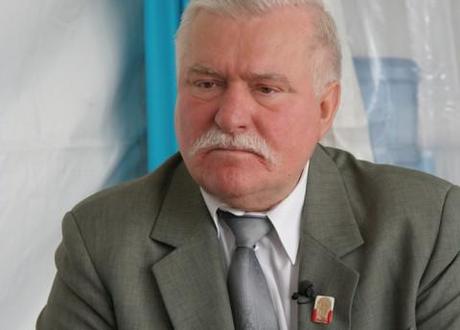
Lech Walesa. Photo credit: MEDEF
Forget the crisis in the eurozone, which creeps ever closer to the EU’s eastern peripheries (watch out, Budapest), the past week in Warsaw has been about historical figures from crises past.
Filming has started on a biopic on Poland’s best known leader, Nobel Peace Prize-winner Lech Walesa, by the country’s best known film director, Oscar-winner Andrzej Wajda, while Lech’s wife, Danuta, meanwhile, has published her autobiography, including some rather raw reminiscences about the Great Man (Lech, not Andrzej, that is).
“I don’t want to, but I must” is perhaps Lech’s best-known remark, one he made when he ran for – and won – Poland’s first presidential election in 1990. Wajda, 85, repeated the famous phrase at a press conference in Warsaw last week, a nice touch and one indicative of the director’s awareness of the task he is undertaking. ”This will be the most difficult movie I have made in my life,” he said.
Walesa has a very mixed legacy in Poland, after fighting what was known as ‘the war at the top’ in the early 1990s against many of his erstwhile comrades in the Solidarity movement and his record of what some consider blunders during his period as president.
Wajda has made it something of an obsession to put to film some of Poland’s more crucial historical moments, his films including Ashes and Diamonds (1958, about the communist’s ascent to power towards the end of the war), Canal (1956, about the failed Warsaw Rising of 1944), Man of Iron and Man of Marble (the former about the early, hopeful years of the communist regime and the latter about the slow collapse of the facade in the 1970s and 1980s), and more recently the Bafta-winner Katyn (about the massacre of Polish officers by Soviet troops in 1940).
The movie, Walesa, due out in the autumn of 2012, will cover the period from the brutally put-down protests by workers in the Baltic sea ports in 1970 – a kind of failed precursor to 1980 – up to Walesa’s speech to the US congress in 1989, after the first free (well, semi-free) elections in June 1989 and before he became president the following year.
Screenwriter Janusz Glowacki has said he plans to show Walesa “as a human being” and “not just as a hero.”
“I agreed to write a script because the director told me that he didn’t want to raise another Walesa monument,” he said.
After reading Danuta’s book, seeing the Great Man as a human being is far less difficult than it may have been before – this despite his five years (1990-95) as president, during which the Great Man tarnished his image among many Poles by some rather lax thinking about the how democracies work.
Danuta writes that she felt very alone and faced a never-ending barrage of domestic work as her husband became an increasingly public figure. Danuta, who had eight children with her husband, says in Dreams and Secrets that she was responsible for all the housework and childcare, even when she was pregnant. “I was a mother, a teacher, a cook, a cleaning lady, a nurse,” she writes. “I had no time to do anything else.”
“We had crowds of union members, advisers, politicians, journalists and lunatics pouring into our apartment from dawn until late at night,” Danuta writes. “Complete chaos instead of a normal home.” Asked why she had decided to publish the book now, Danuta told Polish television: “[T]here comes a time when you have to disclose things, and that is why I have done so.” She said her husband was aware that she was writing her book, but he “never quite believed that I would actually do it.”
Danuta describes her husband as “a loner” who is “introverted and difficult to get to know.” “My initial powerlessness turned into a rebellion,” she writes. “This opposition grew in me until I exploded. Psychologically, I simply could not take this burden anymore.” She and her husband now live mostly separately, she writes.
Meanwhile, another blast from the ’80s, and this time Lech on another, erm, hero. “Let us bow before Ronald Reagan for the fact that our generation was able to bring an end to the great divisions and conflicts of the world,” Walesa said at a ceremony in Warsaw after unveiling a statue to the now deceased US president.
“What happened seemed impossible or unthinkable. The older generations still remember. In Poland, we had more than 200,000 Soviet soldiers. Across Europe, there were more than a million, as well as nuclear weapons. Major changes without a nuclear conflict seemed unlikely,” Lech said, also hailing the role of Polish pope John Paul II, Margaret Thatcher and French president Francois Mitterrand – but not ex-Soviet leader Mikhail Gorbachev.
Jo Harper is the owner and editor of a website about Polish and Central European affairs, Cogo.

